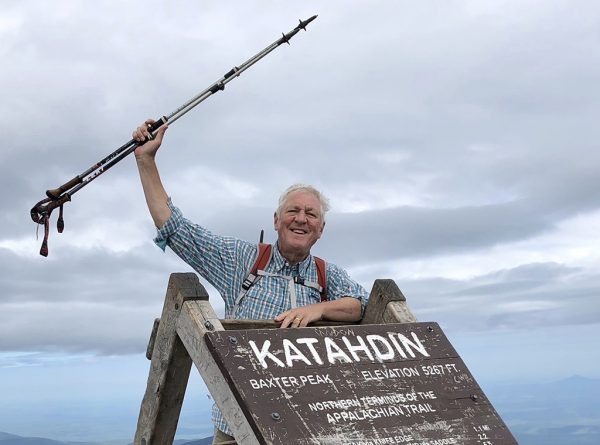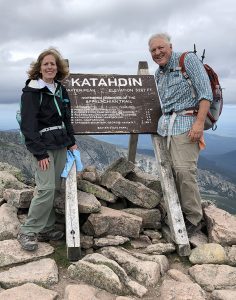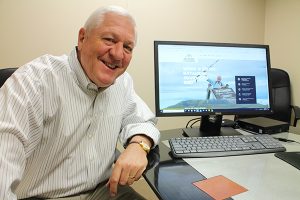Six months after embarking on his lifelong dream of a solo “thru-hike” of the Appalachian Trail, veteran local attorney Bruce Matson has returned to Richmond unscathed, fulfilled and several dozen pounds lighter.
Having successfully completed the nearly 2,200-mile trek from Georgia to Maine, with stops along the way to rest and resupply, the 60-year-old chief legal officer and partner of downtown law firm LeClairRyan said he also comes back a bit wiser, having had plenty of time to reflect on his life over what’s said to be the trail’s 5 million steps.
While his accomplishment was marked with personal loss – his father died just days after he climbed Mount Katahdin, the highest mountain in Maine that marks the trail’s northern terminus – Matson, who first discussed the trip with BizSense in February, reflected on his journey with joy when he recently sat down for a post-hike debriefing.
As he did on his website and podcast along the way, Matson recounted the sights and revelations he experienced while not only fulfilling his personal goal but also raising money for the Appalachian Trail Conservancy. With $4,400 raised when he left in February, on top of a $100,000 matching fund contribution from Matson, his crowdfunding page is now at nearly $32,000.
The following is an edited transcript: (and check out the info box at the bottom of the page)
Richmond BizSense: Congratulations and welcome back. When did you get back to Richmond?
Bruce Matson: It’s complicated. I finished on Sept. 1; I started on Feb. 25. My wife came up and hiked the last day with me on Mount Katahdin, which is a really hard hike. She was with me the first day in Georgia, the last day in Maine, and she also hiked with me in Virginia – she came out to Roanoke and hiked with me, a place called McAfee Knob, which is one of the most famous places on the trail.
She didn’t tell me until we finished, but – my father died the 14th of September. He was 92, lived a really good life. My original plan was to finish on the 1st and then take a whole week to drive from Maine to Virginia and decompress – think through the trip, do some writing, eat a lobster. But because my father was not doing well, we went down to Florida. We had a weekend with my father, and then four days later he died.
He had had a fall in July, and he’d gotten out of the rehab hospital and I was talking to him in August, and he said to me, “Look, I’m going to stick around here until you finish this hike.” That’s basically what he did.
RBS: Your dad followed your trek?
BM: There’s this device called a Spot. It’s a personal locator beacon. It’ll communicate with a satellite and you can know where someone is all the time. My father liked to check out at night where I was, so he was following me on a fairly regular basis. I guess he wanted to see me finish it.
RBS: Even if bittersweet, it must have been good to have a kind of family reunion after being on your own for so long. What was it like being out there by yourself?
BM: There’s a surprisingly good number of people out there. There was never a day where I didn’t see somebody on the trail. There were only three nights that I tented alone out of the whole trip. So, while I was alone, most days I was hiking with or around people all the time.
Sometimes I intentionally hiked with people for a more extended period of time. Most of my time, though, I was more unconnected. My preference generally was I liked to hike alone at least a good part of the day, because I enjoyed the solitude. I enjoyed the time to reflect on 60 years of life and business. I liked to think about the things I’ve done well and the things I haven’t done well and try to think about how to finish – just like finishing the hike – how to finish my life. I’d like to think I’ve got a good decade or so.
RBS: Did you come away with any grand plans or ideas?
BM: Some. My plan is to work less and look for more opportunities to give back.
One of the great things about hiking like that is not that many people get that long a period of time to reflect on things. We reflect for 10 minutes, 30 minutes, maybe longer, but when you’re out there for a long time and long days, it allows you to really think through a lot of things in a pretty deep way, because you’re not rushing the thoughts, you’re not being interrupted very often in your thoughts. It wasn’t always this deep philosophical reflection, but there was plenty of that as well, and it’s almost natural when you’re my age and got to this stage in life and business.
RBS: Did you have any challenges getting through the hike or sticking with it?
BM: I had some support, particularly my wife, who gave encouragement but also sent resupply boxes fairly frequently. When you’re out there, you realize sometimes that you really are faced with the elements and you have some very significant challenges.
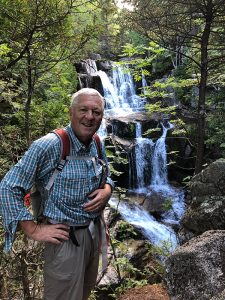 We did have a particularly difficult winter this year. It was unusually cold, and we had two blizzards. There definitely were times when I was out there and hiking by myself in some very tough conditions. It was a little scary from time to time, and you really needed to keep your wits about you.
We did have a particularly difficult winter this year. It was unusually cold, and we had two blizzards. There definitely were times when I was out there and hiking by myself in some very tough conditions. It was a little scary from time to time, and you really needed to keep your wits about you.
It was more dangerous than I thought, both in terms of the hiking experience and the result of intense hiking, as well as some of the situations you put yourself in because of the steepness of the terrain.
RBS: Any injuries?
BM: I fell plenty of times. I probably fell 40 times on the trip. But there was another 40 times when I slipped, if not more. When you hike with poles, you brace yourself or catch yourself to stop from falling. It happened so many times, sometimes it would be vigorous, I injured my shoulder over and over again. It wouldn’t be every day, but it would be violent enough that my shoulder would take a lot of the brunt.
RBS: Was there ever a moment where you hit your limit or questioned whether you wanted to keep going?
BM: There was a time in The Roller Coaster, which is in Northern Virginia in the Shenandoahs – it’s called The Roller Coaster because there’s like 13 hills, one hill after another, and they call them PUDS: “pointless ups and downs” – and I got tired and frustrated. It was my first time where I said if this is going to continue like this for a long time, I don’t know if I’m going to have enough fun. That went away pretty quickly.
I never thought of quitting until I got to New York … when a lot of the conditions were unexpected and it was a very low moment for me. And one more time, in Massachusetts, I’d gotten pretty far but still had Vermont, New Hampshire and Maine to go, and I was just getting tired of being out there. Even though I’ve gone this far, I still have 600 miles to go. I just wasn’t sure how I was going to get through the next 600 miles. That’s when I was eager to have a more regular hiking partner. I thought the camaraderie would help me, and that’s what it did. I had a more regular hiking partner in Vermont and then in Maine that really helped me get through it all.
RBS: I assume you lost some weight on this trip. How much weight did you lose?
BM: Forty-seven pounds. I started out at 252; I finished at 205. My doctor wants me to be at about 210. I’m probably about there now; I’ve gained a little weight since I’ve been back. Obviously what I need to do is keep it off and stay at that weight that the doctor would like to see me at.
RBS: How’s your body holding up? It’s obviously a dramatic transition from being constantly moving to being stationary again.
BM: I’ve been a little stiff. My knees did really well for most of the trip, better than most people my age. I was surprised that my knees didn’t hurt more, because when you’re climbing down a mountain, there’s a tremendous amount of pressure, stress, because you’re holding back your weight to go down something steep. That’s usually what gets to people’s knees in particular.
But when I did the White Mountains, it caught up with me – not in a really bad way, but I did have some pain and some stiffness and stress, and that continued for the rest of the trip. Since I’ve been back, my right knee in particular is still a little stiff from that last two months of hiking.
RBS: What are some of your favorite memories or experiences?
BM: There were certainly lots of days when you were just amazed by the beauty of creation, and the opportunity to be out there and absorb it. Some of my favorite moments, I started referring to it as “the morning after.” Almost always after we went through some tough weather, particularly snow, the morning after, some of the most beautiful moments I ever hiked.
We didn’t see as much wildlife as people would think you do. I did see three bears, saw a bunch of snakes. I never saw a moose; I thought for sure I’d see a moose in New Hampshire or Maine. But there wasn’t as much daily wildlife. There’s certainly plenty of squirrels and chipmunks and birds. Porcupines. I had one skunk come through the campsite one night. Everyone’s holding their breath that this thing would go through and leave us alone.
RBS: Has the trip had an impact on your outlook on business or approach to your work?
BM: I really focused an awful lot on being grateful for all the things I’ve been afforded in my life, and I’d like to think that the perspective that comes with that will make me a little more patient, a little more kind and a little more humble. Those are characteristics that I think we lose sometimes in a competitive business environment, and I think that’s a sad thing. I think there are times when I would lose sight of some of those things that are really important values, and I’d like to think that the hike will give me perspective that sets those values in the right priority.
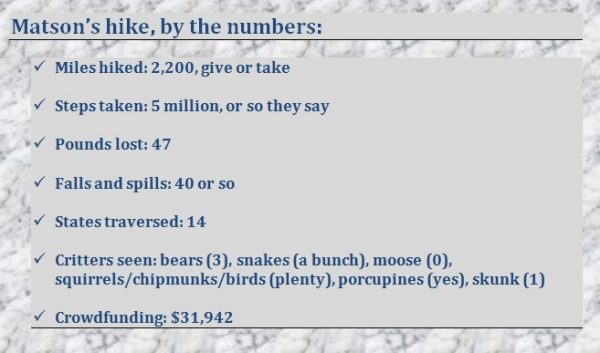
Six months after embarking on his lifelong dream of a solo “thru-hike” of the Appalachian Trail, veteran local attorney Bruce Matson has returned to Richmond unscathed, fulfilled and several dozen pounds lighter.
Having successfully completed the nearly 2,200-mile trek from Georgia to Maine, with stops along the way to rest and resupply, the 60-year-old chief legal officer and partner of downtown law firm LeClairRyan said he also comes back a bit wiser, having had plenty of time to reflect on his life over what’s said to be the trail’s 5 million steps.
While his accomplishment was marked with personal loss – his father died just days after he climbed Mount Katahdin, the highest mountain in Maine that marks the trail’s northern terminus – Matson, who first discussed the trip with BizSense in February, reflected on his journey with joy when he recently sat down for a post-hike debriefing.
As he did on his website and podcast along the way, Matson recounted the sights and revelations he experienced while not only fulfilling his personal goal but also raising money for the Appalachian Trail Conservancy. With $4,400 raised when he left in February, on top of a $100,000 matching fund contribution from Matson, his crowdfunding page is now at nearly $32,000.
The following is an edited transcript: (and check out the info box at the bottom of the page)
Richmond BizSense: Congratulations and welcome back. When did you get back to Richmond?
Bruce Matson: It’s complicated. I finished on Sept. 1; I started on Feb. 25. My wife came up and hiked the last day with me on Mount Katahdin, which is a really hard hike. She was with me the first day in Georgia, the last day in Maine, and she also hiked with me in Virginia – she came out to Roanoke and hiked with me, a place called McAfee Knob, which is one of the most famous places on the trail.
She didn’t tell me until we finished, but – my father died the 14th of September. He was 92, lived a really good life. My original plan was to finish on the 1st and then take a whole week to drive from Maine to Virginia and decompress – think through the trip, do some writing, eat a lobster. But because my father was not doing well, we went down to Florida. We had a weekend with my father, and then four days later he died.
He had had a fall in July, and he’d gotten out of the rehab hospital and I was talking to him in August, and he said to me, “Look, I’m going to stick around here until you finish this hike.” That’s basically what he did.
RBS: Your dad followed your trek?
BM: There’s this device called a Spot. It’s a personal locator beacon. It’ll communicate with a satellite and you can know where someone is all the time. My father liked to check out at night where I was, so he was following me on a fairly regular basis. I guess he wanted to see me finish it.
RBS: Even if bittersweet, it must have been good to have a kind of family reunion after being on your own for so long. What was it like being out there by yourself?
BM: There’s a surprisingly good number of people out there. There was never a day where I didn’t see somebody on the trail. There were only three nights that I tented alone out of the whole trip. So, while I was alone, most days I was hiking with or around people all the time.
Sometimes I intentionally hiked with people for a more extended period of time. Most of my time, though, I was more unconnected. My preference generally was I liked to hike alone at least a good part of the day, because I enjoyed the solitude. I enjoyed the time to reflect on 60 years of life and business. I liked to think about the things I’ve done well and the things I haven’t done well and try to think about how to finish – just like finishing the hike – how to finish my life. I’d like to think I’ve got a good decade or so.
RBS: Did you come away with any grand plans or ideas?
BM: Some. My plan is to work less and look for more opportunities to give back.
One of the great things about hiking like that is not that many people get that long a period of time to reflect on things. We reflect for 10 minutes, 30 minutes, maybe longer, but when you’re out there for a long time and long days, it allows you to really think through a lot of things in a pretty deep way, because you’re not rushing the thoughts, you’re not being interrupted very often in your thoughts. It wasn’t always this deep philosophical reflection, but there was plenty of that as well, and it’s almost natural when you’re my age and got to this stage in life and business.
RBS: Did you have any challenges getting through the hike or sticking with it?
BM: I had some support, particularly my wife, who gave encouragement but also sent resupply boxes fairly frequently. When you’re out there, you realize sometimes that you really are faced with the elements and you have some very significant challenges.
 We did have a particularly difficult winter this year. It was unusually cold, and we had two blizzards. There definitely were times when I was out there and hiking by myself in some very tough conditions. It was a little scary from time to time, and you really needed to keep your wits about you.
We did have a particularly difficult winter this year. It was unusually cold, and we had two blizzards. There definitely were times when I was out there and hiking by myself in some very tough conditions. It was a little scary from time to time, and you really needed to keep your wits about you.
It was more dangerous than I thought, both in terms of the hiking experience and the result of intense hiking, as well as some of the situations you put yourself in because of the steepness of the terrain.
RBS: Any injuries?
BM: I fell plenty of times. I probably fell 40 times on the trip. But there was another 40 times when I slipped, if not more. When you hike with poles, you brace yourself or catch yourself to stop from falling. It happened so many times, sometimes it would be vigorous, I injured my shoulder over and over again. It wouldn’t be every day, but it would be violent enough that my shoulder would take a lot of the brunt.
RBS: Was there ever a moment where you hit your limit or questioned whether you wanted to keep going?
BM: There was a time in The Roller Coaster, which is in Northern Virginia in the Shenandoahs – it’s called The Roller Coaster because there’s like 13 hills, one hill after another, and they call them PUDS: “pointless ups and downs” – and I got tired and frustrated. It was my first time where I said if this is going to continue like this for a long time, I don’t know if I’m going to have enough fun. That went away pretty quickly.
I never thought of quitting until I got to New York … when a lot of the conditions were unexpected and it was a very low moment for me. And one more time, in Massachusetts, I’d gotten pretty far but still had Vermont, New Hampshire and Maine to go, and I was just getting tired of being out there. Even though I’ve gone this far, I still have 600 miles to go. I just wasn’t sure how I was going to get through the next 600 miles. That’s when I was eager to have a more regular hiking partner. I thought the camaraderie would help me, and that’s what it did. I had a more regular hiking partner in Vermont and then in Maine that really helped me get through it all.
RBS: I assume you lost some weight on this trip. How much weight did you lose?
BM: Forty-seven pounds. I started out at 252; I finished at 205. My doctor wants me to be at about 210. I’m probably about there now; I’ve gained a little weight since I’ve been back. Obviously what I need to do is keep it off and stay at that weight that the doctor would like to see me at.
RBS: How’s your body holding up? It’s obviously a dramatic transition from being constantly moving to being stationary again.
BM: I’ve been a little stiff. My knees did really well for most of the trip, better than most people my age. I was surprised that my knees didn’t hurt more, because when you’re climbing down a mountain, there’s a tremendous amount of pressure, stress, because you’re holding back your weight to go down something steep. That’s usually what gets to people’s knees in particular.
But when I did the White Mountains, it caught up with me – not in a really bad way, but I did have some pain and some stiffness and stress, and that continued for the rest of the trip. Since I’ve been back, my right knee in particular is still a little stiff from that last two months of hiking.
RBS: What are some of your favorite memories or experiences?
BM: There were certainly lots of days when you were just amazed by the beauty of creation, and the opportunity to be out there and absorb it. Some of my favorite moments, I started referring to it as “the morning after.” Almost always after we went through some tough weather, particularly snow, the morning after, some of the most beautiful moments I ever hiked.
We didn’t see as much wildlife as people would think you do. I did see three bears, saw a bunch of snakes. I never saw a moose; I thought for sure I’d see a moose in New Hampshire or Maine. But there wasn’t as much daily wildlife. There’s certainly plenty of squirrels and chipmunks and birds. Porcupines. I had one skunk come through the campsite one night. Everyone’s holding their breath that this thing would go through and leave us alone.
RBS: Has the trip had an impact on your outlook on business or approach to your work?
BM: I really focused an awful lot on being grateful for all the things I’ve been afforded in my life, and I’d like to think that the perspective that comes with that will make me a little more patient, a little more kind and a little more humble. Those are characteristics that I think we lose sometimes in a competitive business environment, and I think that’s a sad thing. I think there are times when I would lose sight of some of those things that are really important values, and I’d like to think that the hike will give me perspective that sets those values in the right priority.


